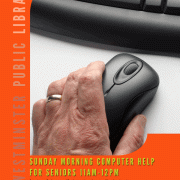The Sunday Computer Help for Seniors program was created to help older adult library users improve their comfort level with technology and gain new tech skills. During the one-hour sessions, led by librarians, each adult student is paired with a teen volunteer and gets constant, personalized assistance. As we have no dedicated computer lab, we are generally unable to offer group classes like this. A solution was found by using the only time the library is closed, which is Sunday mornings. In this way, we can utilize the library's bank of public computers without disturbing other users.
Advanced Planning
There are two main goals for this program. One is to provide additional help for those who need more assistance and time to develop computer-related skills. The other is to provide volunteer hours for teens, who require community volunteer hours for high school completion in our district. Our children's librarians have been involved in recruiting the teens, who volunteer for two hours on the days we offer the program.
We chose to offer these sessions on Sunday, before the library opening hours, due to equipment availability. We've offered the Sunday sessions as a pilot project and have tested two formats: single sessions and series of two sessions on specific topics. Prior to the sessions, we advertised the program, which requires registration, and selected the volunteers. We also recruited a few librarians interested in teaching the sessions and offered them support to create the teaching materials and gave them off-desk hours to prepare. The program proved to be very popular, and we've increased the number of the students from 6 (in 2014) to 12 (in 2015). We've had two challenges: dealing with a high demand from the public and a lower number of volunteers for the sessions.
Marketing
Our usual promotional strategies include: posters in our community; advertising in weekly community newspapers; Facebook and Twitter posts; fliers in the library; press releases; posting to online event calendars; a rotating slide on the library's homepage; a seasonal library events brochure; and participation in a city-wide events calendar. For this program, we also reached out to our local senior center and colleagues in other city departments that serve seniors. Teen recruitment was handled separately. It took several months for interest to build, but now sessions fill well in advance.
Budgeting
The only costs associated with this program are staff time and operational costs involved in running the program, as well as the usual amounts for promotion.
Day-of-event Activity
As we use the library's public access computers, the only set-up needed is to arrange for students and volunteers to be let in before the library opens.
Program Execution
We've had sessions on several topics: email basic and intermediate, basic computer skills, digital photos and Word basics. We had a few no-shows when we first offered the program, but now the seats fill up quickly. The feedback we receive from students attending these sessions has been positive. We still need to work out some details (waitlists, workflow, etc.) but overall the program has been successful.
Advice
Staff in various departments need to collaborate effectively to make it a success. There are several pieces (from selecting the volunteers to registering the students and teaching the sessions) that have to connect very well in order for the program to run smoothly. Also, teamwork is required when preparing the course outlines, handouts, promoting the program, etc. If you are running the program before opening, as we do, make sure no staff members are left alone in the building with the seniors and volunteers, for security reasons.




